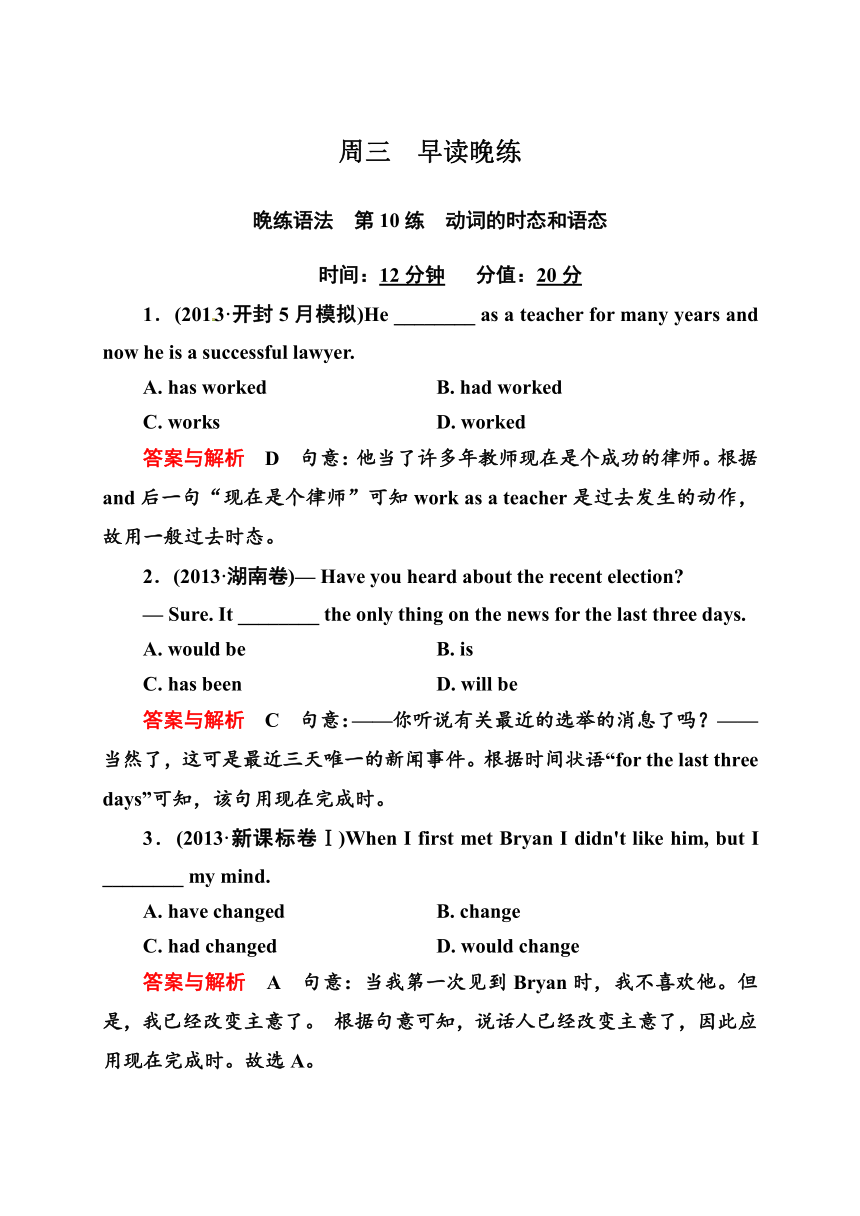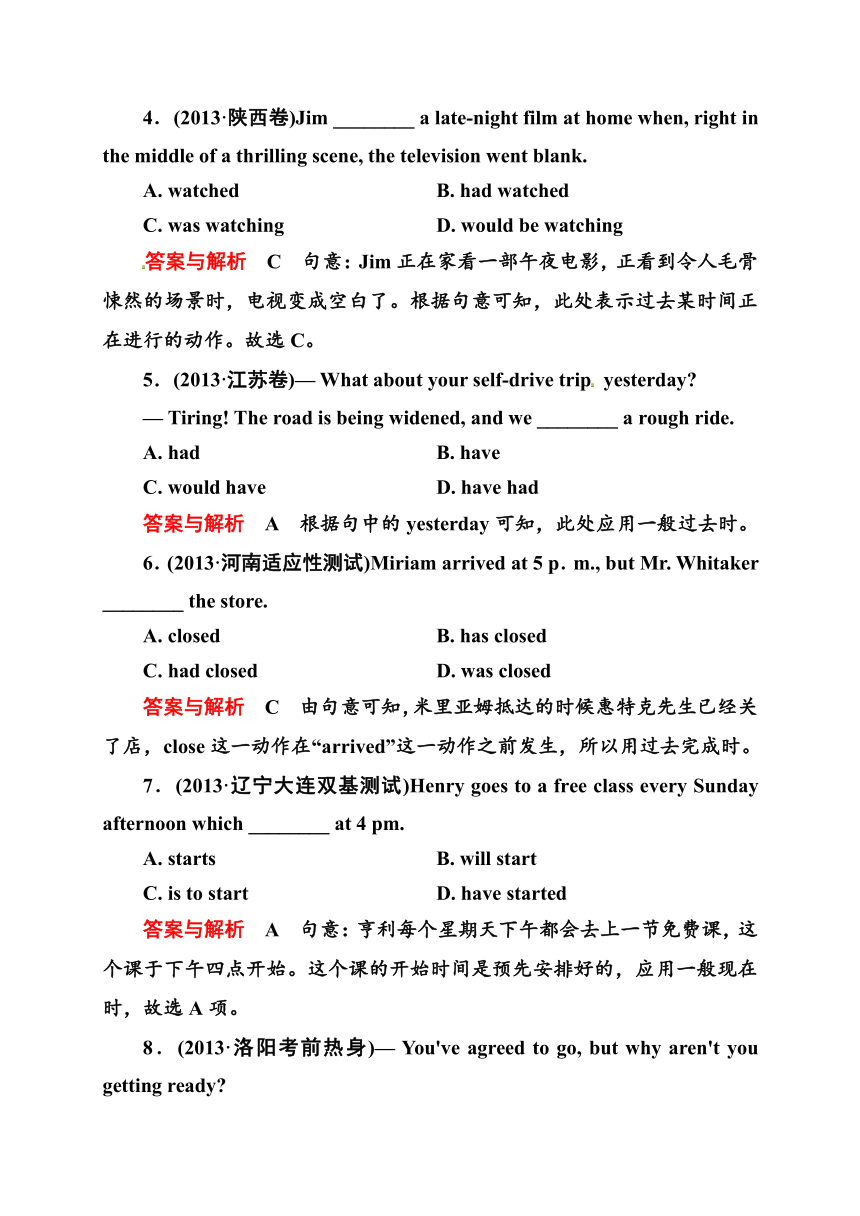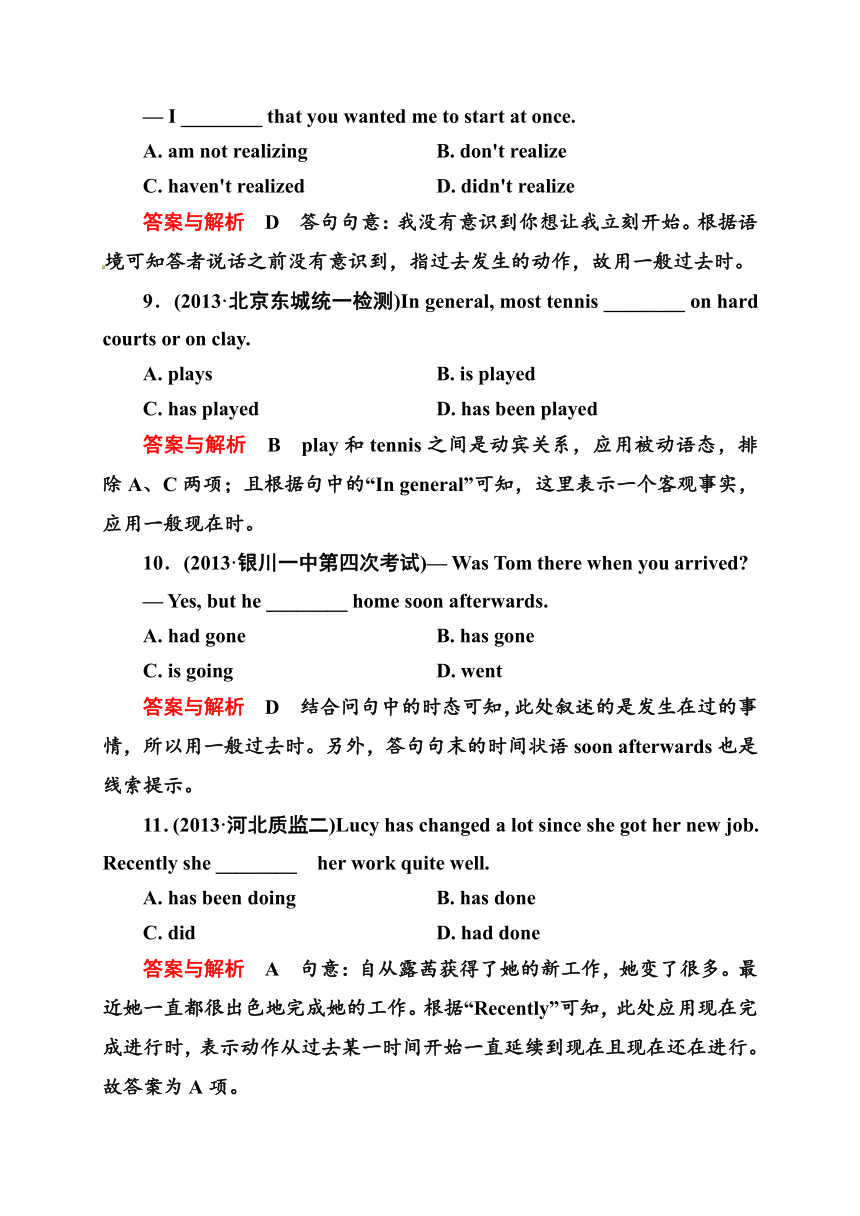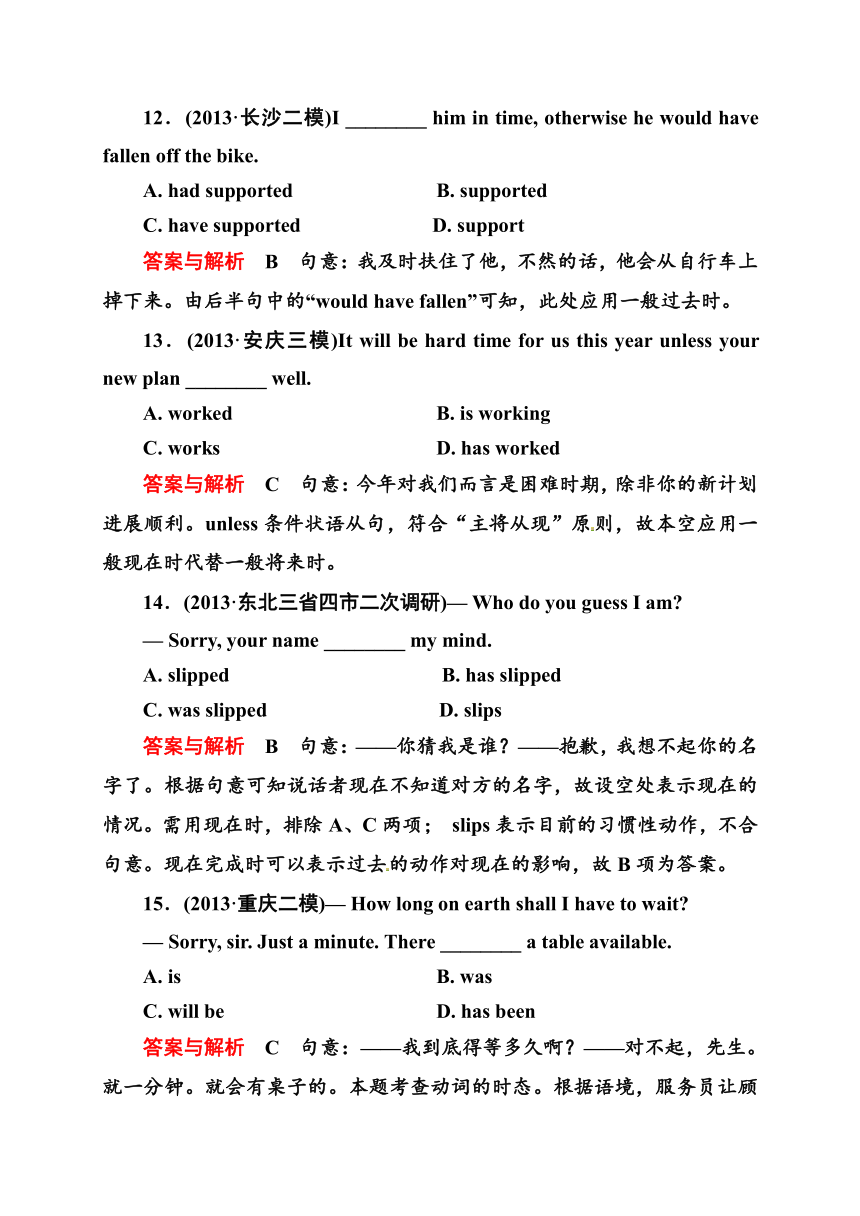《状元之路》2014届高考英语(全国通用)二轮复习钻石卷——早读晚练2-3
文档属性
| 名称 | 《状元之路》2014届高考英语(全国通用)二轮复习钻石卷——早读晚练2-3 |  | |
| 格式 | zip | ||
| 文件大小 | 18.2KB | ||
| 资源类型 | 教案 | ||
| 版本资源 | |||
| 科目 | 英语 | ||
| 更新时间 | 2014-01-30 19:05:26 | ||
图片预览




文档简介
周三 早读晚练
晚练语法 第10练 动词的时态和语态
时间:12分钟 分值:20分
1.(2013·开封5月模拟)He ________ as a teacher for many years and now he is a successful lawyer.
A. has worked B. had worked
C. works D. worked
答案与解析 D 句意:他当了许多年教师现在是个成功的律师。根据and后一句“现在是个律师”可知work as a teacher是过去发生的动作,故用一般过去时态。
2.(2013·湖南卷)— Have you heard about the recent election
— Sure. It ________ the only thing on the news for the last three days.
A. would be B. is
C. has been D. will be
答案与解析 C 句意:——你听说有关最近的选举的消息了吗?——当然了,这可是最近三天唯一的新闻事件。根据时间状语“for the last three days”可知,该句用现在完成时。
3.(2013·新课标卷Ⅰ)When I first met Bryan I didn't like him, but I ________ my mind.
A. have changed B. change
C. had changed D. would change
答案与解析 A 句意:当我第一次见到Bryan时,我不喜欢他。但是,我已经改变主意了。 根据句意可知,说话人已经改变主意了,因此应用现在完成时。故选A。
4.(2013·陕西卷)Jim ________ a late night film at home when, right in the middle of a thrilling scene, the television went blank.
A. watched B. had watched
C. was watching D. would be watching
答案与解析 C 句意:Jim正在家看一部午夜电影,正看到令人毛骨悚然的场景时,电视变成空白了。根据句意可知,此处表示过去某时间正在进行的动作。故选C。
5.(2013·江苏卷)— What about your self drive trip yesterday
— Tiring! The road is being widened, and we ________ a rough ride.
A. had B. have
C. would have D. have had
答案与解析 A 根据句中的yesterday可知,此处应用一般过去时。
6.(2013·河南适应性测试)Miriam arrived at 5 p.m., but Mr. Whitaker ________ the store.
A. closed B. has closed
C. had closed D. was closed
答案与解析 C 由句意可知,米里亚姆抵达的时候惠特克先生已经关了店,close这一动作在“arrived”这一动作之前发生,所以用过去完成时。
7.(2013·辽宁大连双基测试)Henry goes to a free class every Sunday afternoon which ________ at 4 pm.
A. starts B. will start
C. is to start D. have started
答案与解析 A 句意:亨利每个星期天下午都会去上一节免费课,这个课于下午四点开始。这个课的开始时间是预先安排好的,应用一般现在时,故选A项。
8.(2013·洛阳考前热身)— You've agreed to go, but why aren't you getting ready
— I ________ that you wanted me to start at once.
A. am not realizing B. don't realize
C. haven't realized D. didn't realize
答案与解析 D 答句句意:我没有意识到你想让我立刻开始。根据语境可知答者说话之前没有意识到,指过去发生的动作,故用一般过去时。
9.(2013·北京东城统一检测)In general, most tennis ________ on hard courts or on clay.
A. plays B. is played
C. has played D. has been played
答案与解析 B play和tennis之间是动宾关系,应用被动语态,排除A、C两项;且根据句中的“In general”可知,这里表示一个客观事实,应用一般现在时。
10.(2013·银川一中第四次考试)— Was Tom there when you arrived
— Yes, but he ________ home soon afterwards.
A. had gone B. has gone
C. is going D. went
答案与解析 D 结合问句中的时态可知,此处叙述的是发生在过的事情,所以用一般过去时。另外,答句句末的时间状语soon afterwards也是线索提示。
11.(2013·河北质监二)Lucy has changed a lot since she got her new job. Recently she ________ her work quite well.
A. has been doing B. has done
C. did D. had done
答案与解析 A 句意:自从露茜获得了她的新工作,她变了很多。最近她一直都很出色地完成她的工作。根据“Recently”可知,此处应用现在完成进行时,表示动作从过去某一时间开始一直延续到现在且现在还在进行。故答案为A项。
12.(2013·长沙二模)I ________ him in time, otherwise he would have fallen off the bike.
A. had supported B. supported
C. have supported D. support
答案与解析 B 句意:我及时扶住了他,不然的话,他会从自行车上掉下来。由后半句中的“would have fallen”可知,此处应用一般过去时。
13.(2013·安庆三模)It will be hard time for us this year unless your new plan ________ well.
A. worked B. is working
C. works D. has worked
答案与解析 C 句意:今年对我们而言是困难时期,除非你的新计划进展顺利。unless条件状语从句,符合“主将从现”原则,故本空应用一般现在时代替一般将来时。
14.(2013·东北三省四市二次调研)— Who do you guess I am
— Sorry, your name ________ my mind.
A. slipped B. has slipped
C. was slipped D. slips
答案与解析 B 句意:——你猜我是谁?——抱歉,我想不起你的名字了。根据句意可知说话者现在不知道对方的名字,故设空处表示现在的情况。需用现在时,排除A、C两项; slips表示目前的习惯性动作,不合句意。现在完成时可以表示过去的动作对现在的影响,故B项为答案。
15.(2013·重庆二模)— How long on earth shall I have to wait
— Sorry, sir. Just a minute. There ________ a table available.
A. is B. was
C. will be D. has been
答案与解析 C 句意:——我到底得等多久啊?——对不起,先生。就一分钟。就会有桌子的。本题考查动词的时态。根据语境,服务员让顾客再等一分钟,也就是说一分钟后就会有桌子,应用一般将来时,故选C项。
16.(2013·宝鸡三模)By the year the girl comes back to life, scientists probably ________ a cure for this incurable disease.
A. will have discovered B. are discovering
C. will be discovering D. have discovered
答案与解析 A 句意:到这个小女孩苏醒过来的时候,科学家们很可能已经找到了这种不治之症的治疗方法。此处表示到将来某个时间点将会完成的动作,因此用将来完成时。
17.(2013·广西三市一次联考)— When did you come back
— Half an hour ago. You ________ to music.
A. have been listening B. were listening
C. had listened D. listened
答案与解析 B 句意:——你什么时候回来的?——半小时前,当时你正在听音乐。此处表示过去某一时刻正在进行的动作,因此用过去进行时。
18.(2013·四川资阳一模)— Oh, you're so busy now! How about 5 o'clock this afternoon
— No. I'm sorry, but then I ________ a lecture.
A. attend B. is attending
C. will attend D. will be attending
答案与解析 D 句意:——哦,你现在这么忙啊!今天下午5点怎么样?——不,对不起,那个时候我将正在参加一个讲座。then指的是5 o'clock this afternoon, attend是在then表示的时间发生,故用将来进行时。
19.(2013·清华附中模拟)In the rainforest of the Amazon, 50 to 150 plant species ________ every day.
A. are being destroyed B. are destroying
C. have been destroyed D. destroyed
答案与解析 A 句意:在亚马逊雨林每天有50到150种植物灭绝。这里表示的是现阶段存在的持续性动作,且destroy与plant species之间为动宾关系,故用现在进行时的被动语态,因此选A。
20.(2013·北京西城区二模)— Do you know our school at all
— No, this is the first time I ________ here.
A. was B. have been
C. came D. am coming
答案与解析 B 句意:——你了解我们学校吗?——不了解,这是我第一次来这儿。“It is the first time+sb. have done”为固定句式,意为“这是某人第一次……”。故答案选B。同时要注意:如果是it was the first time,其后则用“had done”形式。
早读背诵 热点写作话题(五) 语言学习
A话题单词
1.grammar n. 语法
2.dialect n.方言
3.accent n.口音
4.sentence n. 句子
5.usage n.使用;用法
6.expression n. 词语;表达
7.command vt. & n. 命令;指令
8.vocabulary n. 词汇
9.pronunciation n. 发音
10.gradually adv. 逐渐地
11.enrich vt. 使充实;使丰富
12.official adj. 官方的;正式的
13.conquer vt. 占领;征服
14.actually adv. 事实上
15.benefit vt. 受益
16.fluent adj. 流利的
17.recognize vt. 认出;承认
18.frequent adj. 频繁的;经常的
19.request vt. & n. 要求;请求
20.standard n. 标准特别关注 1.recognise(3年2考)
It is recognised that this is an unpleasant choice to have to make.
我们承认这是不得不做的令人不快的决定。
His novel was eventually recognised as a work of genius.
他的小说最终被公认为天才之作。
2.request(3年2考)
(1)
(2)
(3)request that+从句“请求……”,request后的宾语从句、表语从句、同位语从句以及It is requested that ..从句中用虚拟语气,即谓语动词用(should+)动词原形。
I requested that he should come an hour earlier.
我请求他早一个小时来。
B话题短语
1.language learning strategies 语言学习策略 2.form the habit of reading 养成阅读习惯
3.attitudes to learning学习态度 4.make_use_of利用
5.have a good knowledge/command of ... 精通…… 6.play a part in 扮演……角色;充当……作用
7.pay off 取得成功;付清 8.even if/though 即使
9.regard ...as 把……当作…… 10.the effective ways to do sth.有效的办事方法
11.a large number of 大量的 12.believe it or not 信不信由你
13.have an advantage over 在……有优势 14.enlarge one's vocabulary 扩大某人的词汇量
15.develop one's interest 培养兴趣 16.have difficulty doing/with_sth. 费力做某事
C话题佳句
1.We should make it a rule to get up early and read English every morning.
我们应该习惯于每天早上早起读英语。
2.Practise as often as possible, and you will make progress.
尽可能经常练习,这样你就可以取得进步。
3.Therefore, a good command of English will greatly benefit me in my work.
因此,善于运用英语能够大大地使我的工作受益。
4.In the competition for a well paid job, the one who can speak fluent English has an advantage over those who cannot.
在竞争找工作的时候,会说流利英语的人就会比不会说英语的人有优势。
5.Not only can we learn language from books and media, but also from people around us.
我们不仅能从书里、媒体里而且还能从周围的人那里学习语言。
6.All in all, every road leads to Rome, and I believe hard work must pay off.
总之,条条道路通罗马。我相信艰苦的努力一定会得到好的结果。
晚练语法 第10练 动词的时态和语态
时间:12分钟 分值:20分
1.(2013·开封5月模拟)He ________ as a teacher for many years and now he is a successful lawyer.
A. has worked B. had worked
C. works D. worked
答案与解析 D 句意:他当了许多年教师现在是个成功的律师。根据and后一句“现在是个律师”可知work as a teacher是过去发生的动作,故用一般过去时态。
2.(2013·湖南卷)— Have you heard about the recent election
— Sure. It ________ the only thing on the news for the last three days.
A. would be B. is
C. has been D. will be
答案与解析 C 句意:——你听说有关最近的选举的消息了吗?——当然了,这可是最近三天唯一的新闻事件。根据时间状语“for the last three days”可知,该句用现在完成时。
3.(2013·新课标卷Ⅰ)When I first met Bryan I didn't like him, but I ________ my mind.
A. have changed B. change
C. had changed D. would change
答案与解析 A 句意:当我第一次见到Bryan时,我不喜欢他。但是,我已经改变主意了。 根据句意可知,说话人已经改变主意了,因此应用现在完成时。故选A。
4.(2013·陕西卷)Jim ________ a late night film at home when, right in the middle of a thrilling scene, the television went blank.
A. watched B. had watched
C. was watching D. would be watching
答案与解析 C 句意:Jim正在家看一部午夜电影,正看到令人毛骨悚然的场景时,电视变成空白了。根据句意可知,此处表示过去某时间正在进行的动作。故选C。
5.(2013·江苏卷)— What about your self drive trip yesterday
— Tiring! The road is being widened, and we ________ a rough ride.
A. had B. have
C. would have D. have had
答案与解析 A 根据句中的yesterday可知,此处应用一般过去时。
6.(2013·河南适应性测试)Miriam arrived at 5 p.m., but Mr. Whitaker ________ the store.
A. closed B. has closed
C. had closed D. was closed
答案与解析 C 由句意可知,米里亚姆抵达的时候惠特克先生已经关了店,close这一动作在“arrived”这一动作之前发生,所以用过去完成时。
7.(2013·辽宁大连双基测试)Henry goes to a free class every Sunday afternoon which ________ at 4 pm.
A. starts B. will start
C. is to start D. have started
答案与解析 A 句意:亨利每个星期天下午都会去上一节免费课,这个课于下午四点开始。这个课的开始时间是预先安排好的,应用一般现在时,故选A项。
8.(2013·洛阳考前热身)— You've agreed to go, but why aren't you getting ready
— I ________ that you wanted me to start at once.
A. am not realizing B. don't realize
C. haven't realized D. didn't realize
答案与解析 D 答句句意:我没有意识到你想让我立刻开始。根据语境可知答者说话之前没有意识到,指过去发生的动作,故用一般过去时。
9.(2013·北京东城统一检测)In general, most tennis ________ on hard courts or on clay.
A. plays B. is played
C. has played D. has been played
答案与解析 B play和tennis之间是动宾关系,应用被动语态,排除A、C两项;且根据句中的“In general”可知,这里表示一个客观事实,应用一般现在时。
10.(2013·银川一中第四次考试)— Was Tom there when you arrived
— Yes, but he ________ home soon afterwards.
A. had gone B. has gone
C. is going D. went
答案与解析 D 结合问句中的时态可知,此处叙述的是发生在过的事情,所以用一般过去时。另外,答句句末的时间状语soon afterwards也是线索提示。
11.(2013·河北质监二)Lucy has changed a lot since she got her new job. Recently she ________ her work quite well.
A. has been doing B. has done
C. did D. had done
答案与解析 A 句意:自从露茜获得了她的新工作,她变了很多。最近她一直都很出色地完成她的工作。根据“Recently”可知,此处应用现在完成进行时,表示动作从过去某一时间开始一直延续到现在且现在还在进行。故答案为A项。
12.(2013·长沙二模)I ________ him in time, otherwise he would have fallen off the bike.
A. had supported B. supported
C. have supported D. support
答案与解析 B 句意:我及时扶住了他,不然的话,他会从自行车上掉下来。由后半句中的“would have fallen”可知,此处应用一般过去时。
13.(2013·安庆三模)It will be hard time for us this year unless your new plan ________ well.
A. worked B. is working
C. works D. has worked
答案与解析 C 句意:今年对我们而言是困难时期,除非你的新计划进展顺利。unless条件状语从句,符合“主将从现”原则,故本空应用一般现在时代替一般将来时。
14.(2013·东北三省四市二次调研)— Who do you guess I am
— Sorry, your name ________ my mind.
A. slipped B. has slipped
C. was slipped D. slips
答案与解析 B 句意:——你猜我是谁?——抱歉,我想不起你的名字了。根据句意可知说话者现在不知道对方的名字,故设空处表示现在的情况。需用现在时,排除A、C两项; slips表示目前的习惯性动作,不合句意。现在完成时可以表示过去的动作对现在的影响,故B项为答案。
15.(2013·重庆二模)— How long on earth shall I have to wait
— Sorry, sir. Just a minute. There ________ a table available.
A. is B. was
C. will be D. has been
答案与解析 C 句意:——我到底得等多久啊?——对不起,先生。就一分钟。就会有桌子的。本题考查动词的时态。根据语境,服务员让顾客再等一分钟,也就是说一分钟后就会有桌子,应用一般将来时,故选C项。
16.(2013·宝鸡三模)By the year the girl comes back to life, scientists probably ________ a cure for this incurable disease.
A. will have discovered B. are discovering
C. will be discovering D. have discovered
答案与解析 A 句意:到这个小女孩苏醒过来的时候,科学家们很可能已经找到了这种不治之症的治疗方法。此处表示到将来某个时间点将会完成的动作,因此用将来完成时。
17.(2013·广西三市一次联考)— When did you come back
— Half an hour ago. You ________ to music.
A. have been listening B. were listening
C. had listened D. listened
答案与解析 B 句意:——你什么时候回来的?——半小时前,当时你正在听音乐。此处表示过去某一时刻正在进行的动作,因此用过去进行时。
18.(2013·四川资阳一模)— Oh, you're so busy now! How about 5 o'clock this afternoon
— No. I'm sorry, but then I ________ a lecture.
A. attend B. is attending
C. will attend D. will be attending
答案与解析 D 句意:——哦,你现在这么忙啊!今天下午5点怎么样?——不,对不起,那个时候我将正在参加一个讲座。then指的是5 o'clock this afternoon, attend是在then表示的时间发生,故用将来进行时。
19.(2013·清华附中模拟)In the rainforest of the Amazon, 50 to 150 plant species ________ every day.
A. are being destroyed B. are destroying
C. have been destroyed D. destroyed
答案与解析 A 句意:在亚马逊雨林每天有50到150种植物灭绝。这里表示的是现阶段存在的持续性动作,且destroy与plant species之间为动宾关系,故用现在进行时的被动语态,因此选A。
20.(2013·北京西城区二模)— Do you know our school at all
— No, this is the first time I ________ here.
A. was B. have been
C. came D. am coming
答案与解析 B 句意:——你了解我们学校吗?——不了解,这是我第一次来这儿。“It is the first time+sb. have done”为固定句式,意为“这是某人第一次……”。故答案选B。同时要注意:如果是it was the first time,其后则用“had done”形式。
早读背诵 热点写作话题(五) 语言学习
A话题单词
1.grammar n. 语法
2.dialect n.方言
3.accent n.口音
4.sentence n. 句子
5.usage n.使用;用法
6.expression n. 词语;表达
7.command vt. & n. 命令;指令
8.vocabulary n. 词汇
9.pronunciation n. 发音
10.gradually adv. 逐渐地
11.enrich vt. 使充实;使丰富
12.official adj. 官方的;正式的
13.conquer vt. 占领;征服
14.actually adv. 事实上
15.benefit vt. 受益
16.fluent adj. 流利的
17.recognize vt. 认出;承认
18.frequent adj. 频繁的;经常的
19.request vt. & n. 要求;请求
20.standard n. 标准特别关注 1.recognise(3年2考)
It is recognised that this is an unpleasant choice to have to make.
我们承认这是不得不做的令人不快的决定。
His novel was eventually recognised as a work of genius.
他的小说最终被公认为天才之作。
2.request(3年2考)
(1)
(2)
(3)request that+从句“请求……”,request后的宾语从句、表语从句、同位语从句以及It is requested that ..从句中用虚拟语气,即谓语动词用(should+)动词原形。
I requested that he should come an hour earlier.
我请求他早一个小时来。
B话题短语
1.language learning strategies 语言学习策略 2.form the habit of reading 养成阅读习惯
3.attitudes to learning学习态度 4.make_use_of利用
5.have a good knowledge/command of ... 精通…… 6.play a part in 扮演……角色;充当……作用
7.pay off 取得成功;付清 8.even if/though 即使
9.regard ...as 把……当作…… 10.the effective ways to do sth.有效的办事方法
11.a large number of 大量的 12.believe it or not 信不信由你
13.have an advantage over 在……有优势 14.enlarge one's vocabulary 扩大某人的词汇量
15.develop one's interest 培养兴趣 16.have difficulty doing/with_sth. 费力做某事
C话题佳句
1.We should make it a rule to get up early and read English every morning.
我们应该习惯于每天早上早起读英语。
2.Practise as often as possible, and you will make progress.
尽可能经常练习,这样你就可以取得进步。
3.Therefore, a good command of English will greatly benefit me in my work.
因此,善于运用英语能够大大地使我的工作受益。
4.In the competition for a well paid job, the one who can speak fluent English has an advantage over those who cannot.
在竞争找工作的时候,会说流利英语的人就会比不会说英语的人有优势。
5.Not only can we learn language from books and media, but also from people around us.
我们不仅能从书里、媒体里而且还能从周围的人那里学习语言。
6.All in all, every road leads to Rome, and I believe hard work must pay off.
总之,条条道路通罗马。我相信艰苦的努力一定会得到好的结果。
